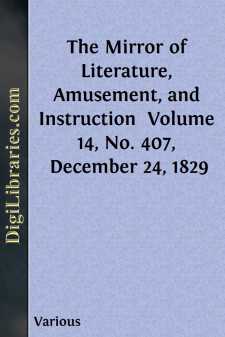Categories
- Antiques & Collectibles 13
- Architecture 36
- Art 48
- Bibles 22
- Biography & Autobiography 813
- Body, Mind & Spirit 142
- Business & Economics 28
- Children's Books 14
- Children's Fiction 11
- Computers 4
- Cooking 94
- Crafts & Hobbies 4
- Drama 346
- Education 46
- Family & Relationships 57
- Fiction 11829
- Games 19
- Gardening 17
- Health & Fitness 34
- History 1377
- House & Home 1
- Humor 147
- Juvenile Fiction 1873
- Juvenile Nonfiction 202
- Language Arts & Disciplines 88
- Law 16
- Literary Collections 686
- Literary Criticism 179
- Mathematics 13
- Medical 41
- Music 40
- Nature 179
- Non-Classifiable 1768
- Performing Arts 7
- Periodicals 1453
- Philosophy 64
- Photography 2
- Poetry 896
- Political Science 203
- Psychology 42
- Reference 154
- Religion 513
- Science 126
- Self-Help 84
- Social Science 81
- Sports & Recreation 34
- Study Aids 3
- Technology & Engineering 59
- Transportation 23
- Travel 463
- True Crime 29
The Mirror of Literature, Amusement, and Instruction Volume 14, No. 407, December 24, 1829
by: Various
Categories:
Description:
Excerpt
MEMOIR OF THOMAS CAMPBELL, ESQ.
Of the subject of this memoir, it has been remarked, "that he has not, that we know of, written one line, which, dying, he could wish to blot." These few words will better illustrate the fitness of Mr. Campbell's portrait for our volume, than a laudatory memoir of many pages. He has not inaptly been styled the Tyrtaeus of modern English poetry, and one of the most chaste and tender as well as original of poets. He owes less than any other British poet to his predecessors and contemporaries. He has lived to see his lines quoted like those of earlier poets in the literature of his day, lisped by children, and sung at public festivals. The war-odes of Campbell have scarcely anything to match them in-the English language for energy and fire, while their condensation and the felicitous selection of their versification are in remarkable harmony. Campbell, in allusion to Cymon, has been said to have "conquered both on land and sea," from his Naval Odes and "Hohenlinden" embracing both scenes of warfare.
Scotland gave birth to Thomas Campbell. He is the son of a second marriage, and was born at Glasgow, in 1777. His father was born in 1710, and was consequently nearly seventy years of age when the poet, his son, was ushered into the world. He was sent early to school, in his native place, and his instructor was Dr. David Alison, a man of great celebrity in the practice of education. He had a method of instruction in the classics purely his own, by which he taught with great facility, and at the same time rejected all harsh discipline, substituting kindness for terror, and alluring rather than compelling the pupil to his duty. Campbell began to write verse when young; and some of his earliest attempts at poetry are yet extant among his friends in Scotland. For his place of education he had a great respect, as well as for the memory of his masters, of whom he always spoke in terms of great affection. He was twelve years old when he quitted school for the University of Glasgow. There he was considered an excellent Latin scholar, and gained high honour by a contest with a candidate twice as old as himself, by which he obtained a bursary. He constantly bore away the prizes, and every fresh success only seemed to stimulate him to more ambitious exertions. In Greek he was considered the foremost student of his age; and some of his translations are said to be superior to any before offered for competition in the University. While there he made poetical paraphrases of the most celebrated Greek poets; of Aeschylus, Sophocles, and Aristophanes, which were thought efforts of extraordinary promise. Dr. Millar at that time gave philosophical lectures in Glasgow. He was a highly gifted teacher, and excellent man. His lectures attracted the attention of young Campbell, who became his pupil, and studied with eagerness the principles of sound philosophy; the poet was favoured with the confidence of his teacher, and partook much of his society.
Campbell quitted Glasgow to remove into Argyleshire, where a situation in a family of some note was offered and accepted by him....












